2022届高考英语二轮复习Noun clause名词性从句按类型课件 (48张ppt)
文档属性
| 名称 | 2022届高考英语二轮复习Noun clause名词性从句按类型课件 (48张ppt) | 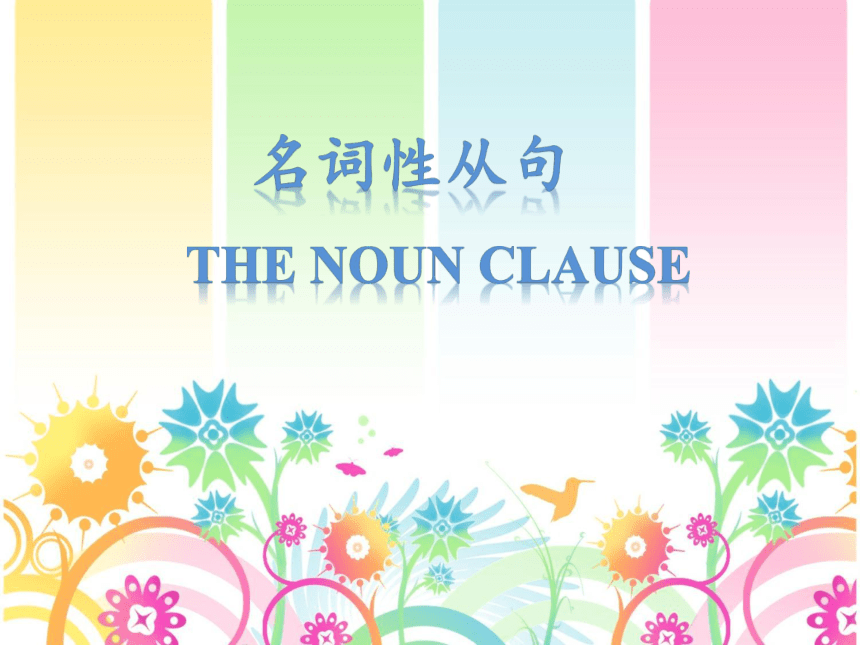 | |
| 格式 | zip | ||
| 文件大小 | 288.9KB | ||
| 资源类型 | 试卷 | ||
| 版本资源 | 通用版 | ||
| 科目 | 英语 | ||
| 更新时间 | 2021-12-01 12:01:48 | ||
图片预览

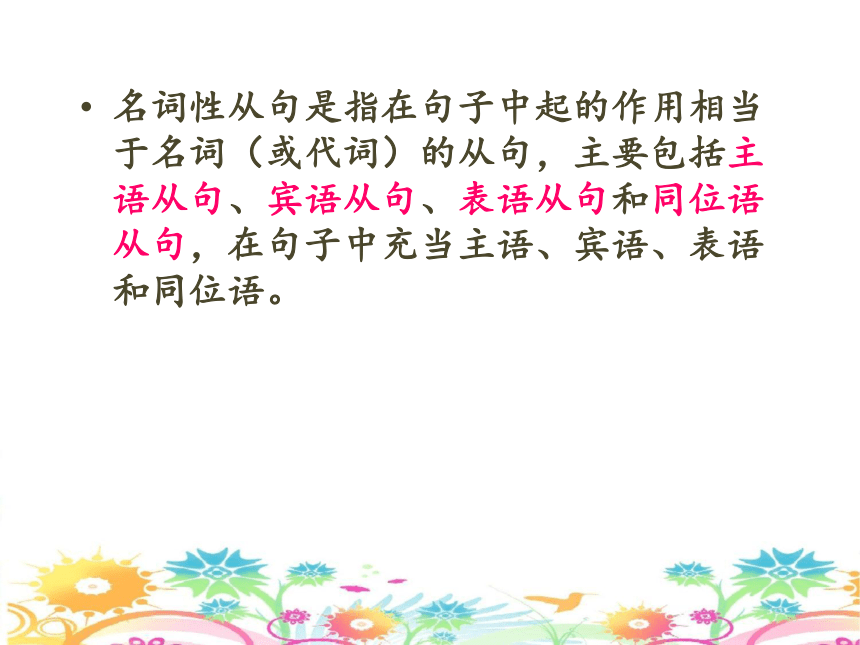
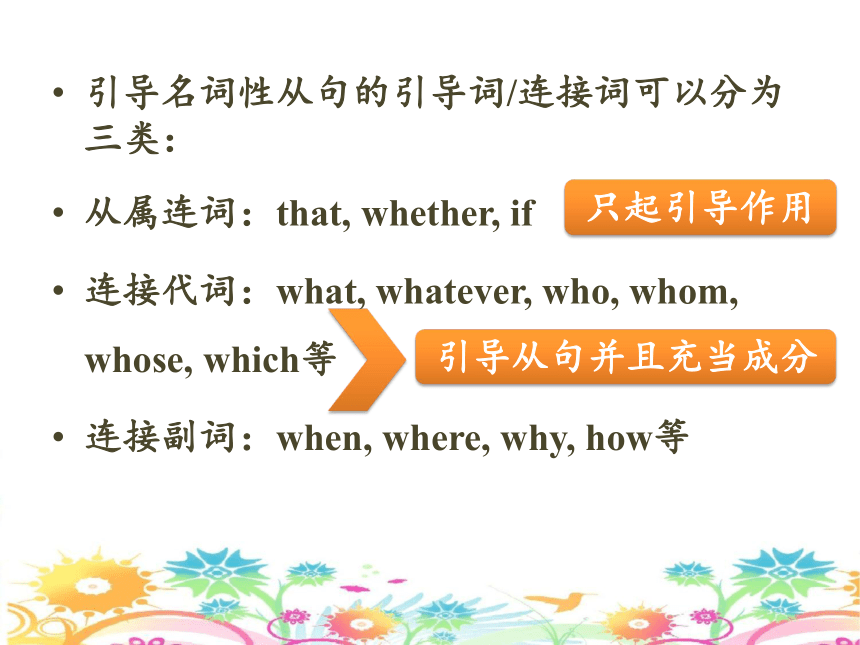
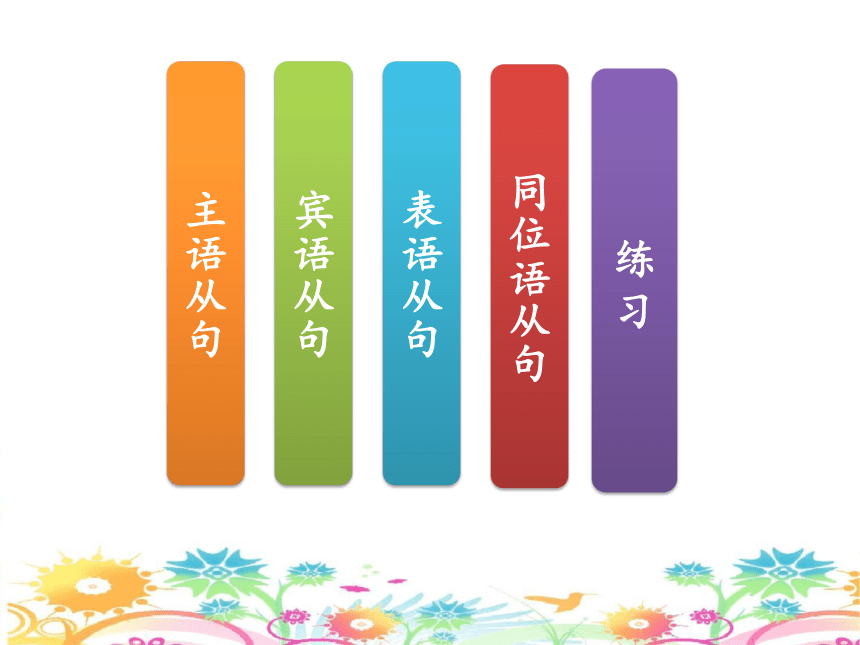

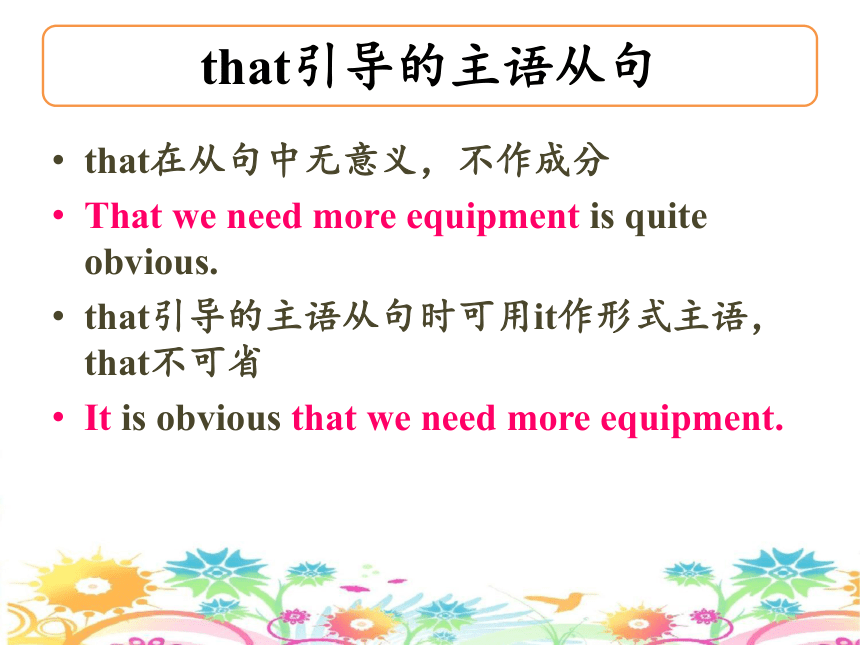
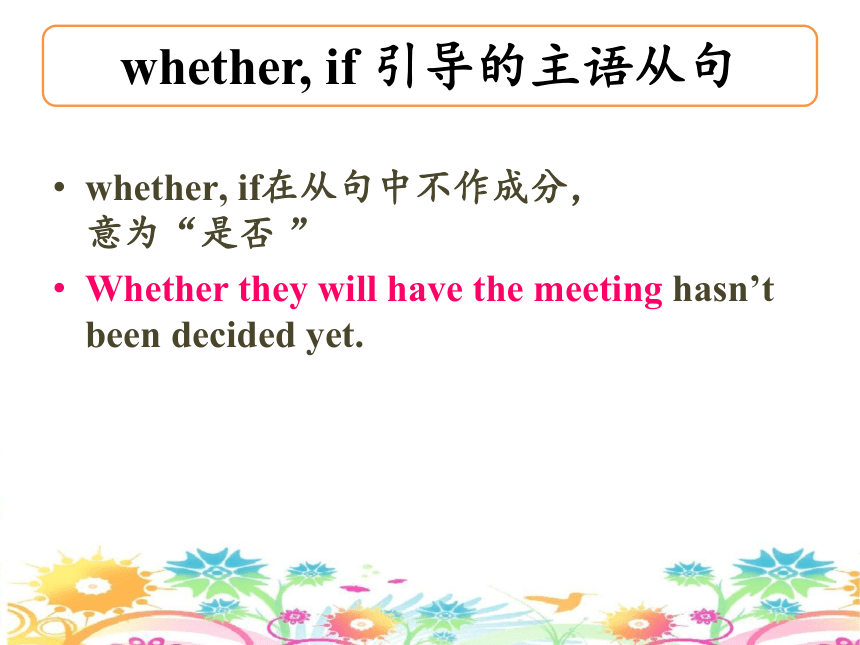
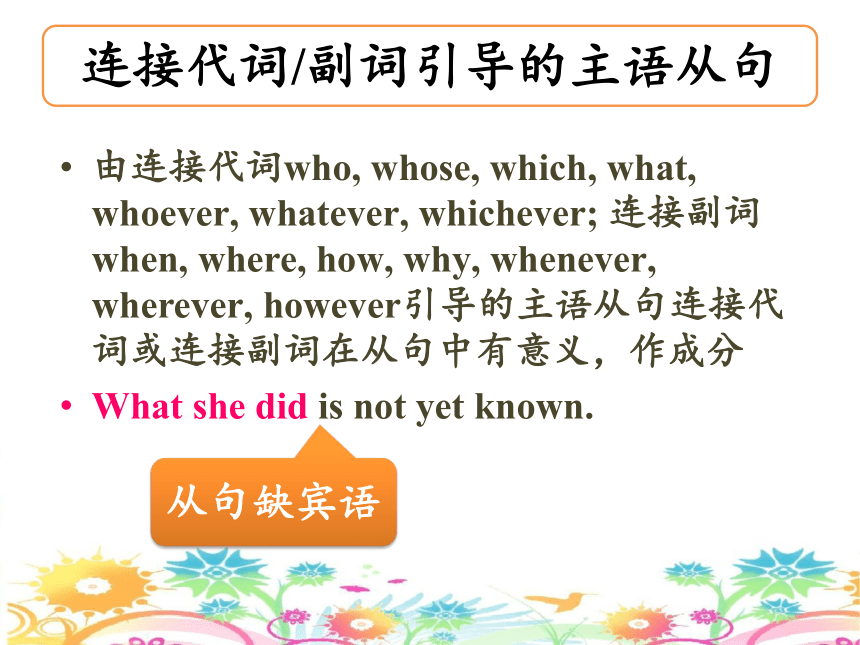
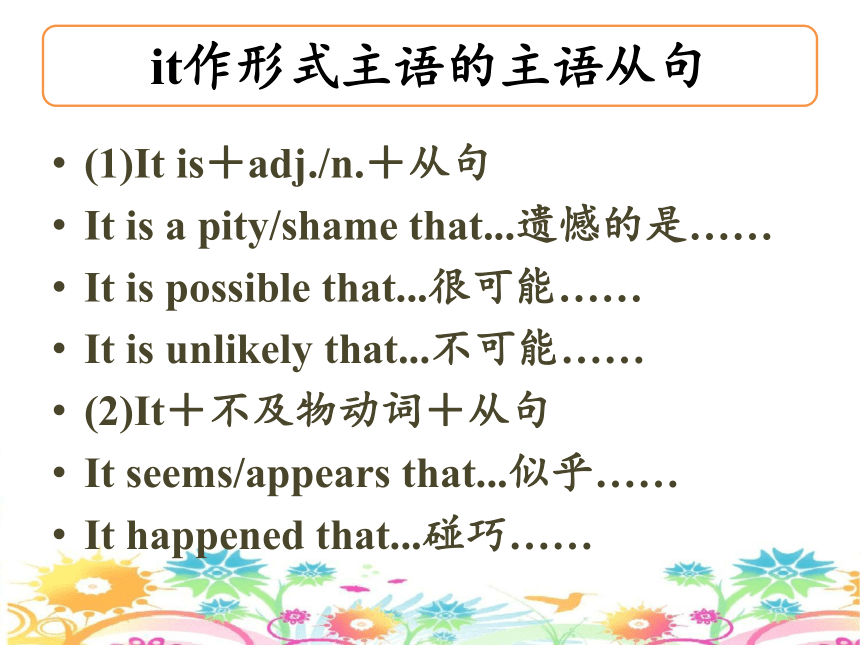
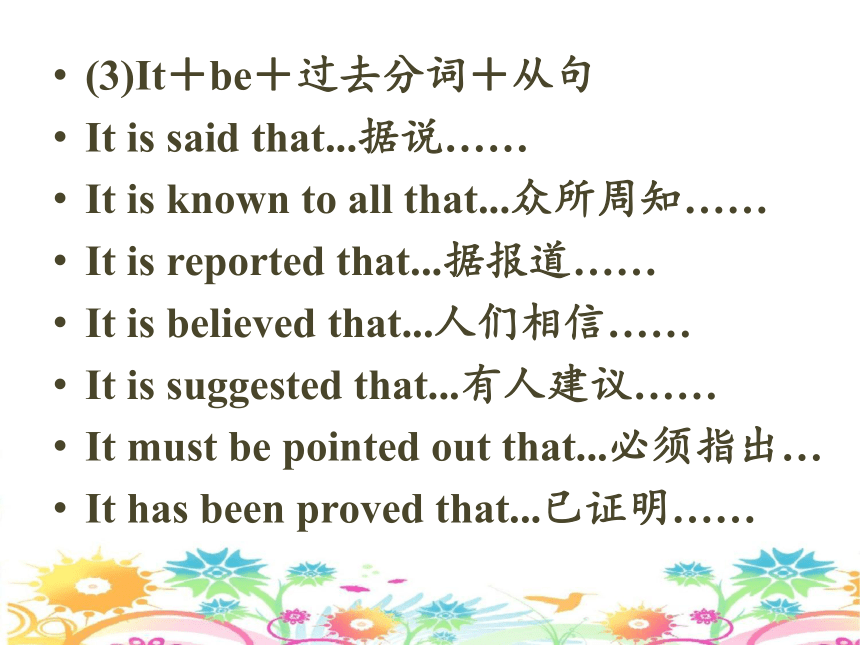
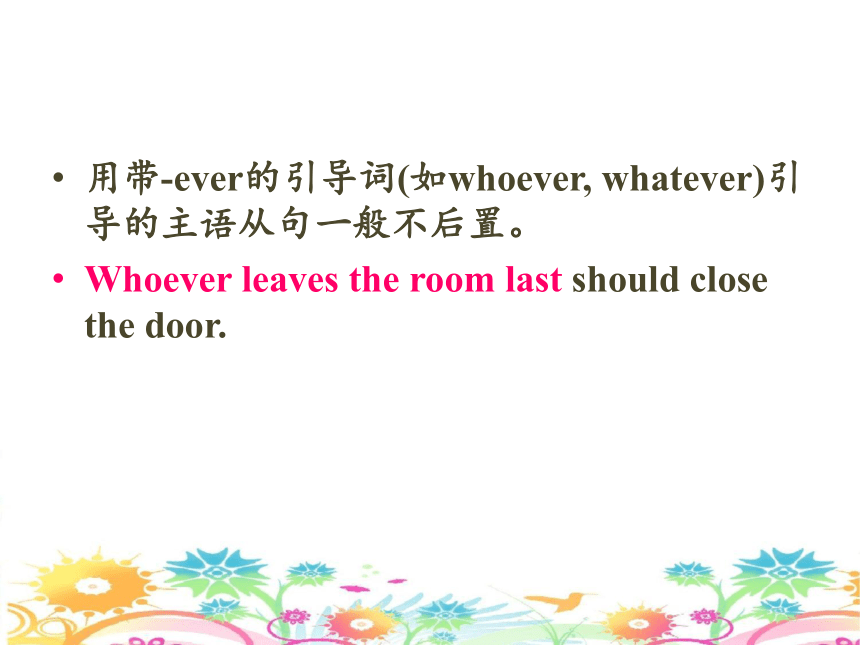
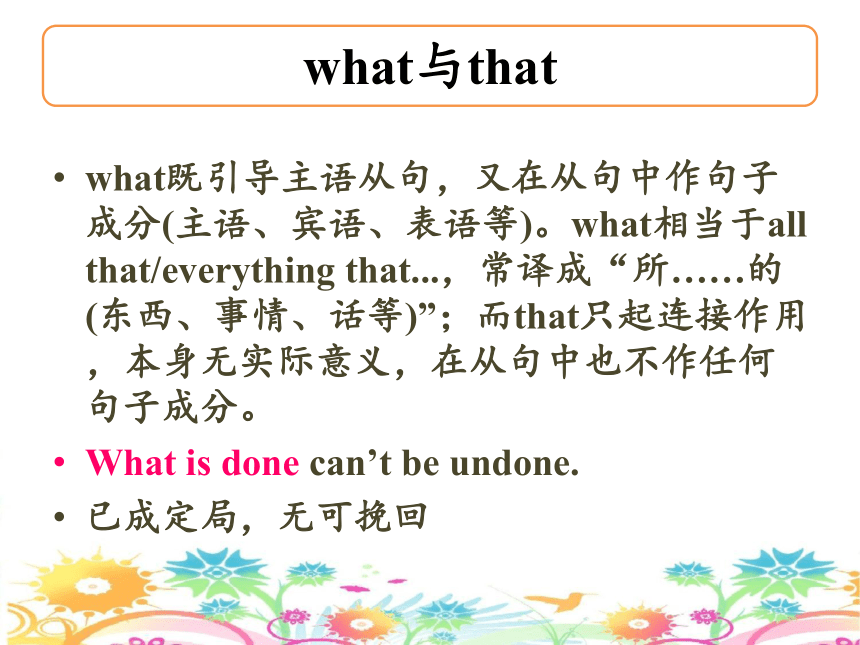
文档简介
(共48张PPT)
名词性从句
the noun clause
名词性从句是指在句子中起的作用相当于名词(或代词)的从句,主要包括主语从句、宾语从句、表语从句和同位语从句,在句子中充当主语、宾语、表语和同位语。
引导名词性从句的引导词/连接词可以分为三类:
从属连词:that, whether, if
连接代词:what, whatever, who, whom, whose, which等
连接副词:when, where, why, how等
只起引导作用
引导从句并且充当成分
主语从句
宾语从句
表语从句
练习
同位语从句
主语从句
that引导的主语从句
that在从句中无意义,不作成分
That we need more equipment is quite obvious.
that引导的主语从句时可用it作形式主语,that不可省
It is obvious that we need more equipment.
whether, if 引导的主语从句
whether, if在从句中不作成分, 意为“是否 ”
Whether they will have the meeting hasn’t been decided yet.
连接代词/副词引导的主语从句
由连接代词who, whose, which, what, whoever, whatever, whichever; 连接副词when, where, how, why, whenever, wherever, however引导的主语从句连接代词或连接副词在从句中有意义,作成分
What she did is not yet known.
从句缺宾语
it作形式主语的主语从句
(1)It is+adj./n.+从句
It is a pity/shame that...遗憾的是……
It is possible that...很可能……
It is unlikely that...不可能……
(2)It+不及物动词+从句
It seems/appears that...似乎……
It happened that...碰巧……
(3)It+be+过去分词+从句
It is said that...据说……
It is known to all that...众所周知……
It is reported that...据报道……
It is believed that...人们相信……
It is suggested that...有人建议……
It must be pointed out that...必须指出…
It has been proved that...已证明……
用带-ever的引导词(如whoever, whatever)引导的主语从句一般不后置。
Whoever leaves the room last should close the door.
what与that
what既引导主语从句,又在从句中作句子成分(主语、宾语、表语等)。what相当于all that/everything that...,常译成“所……的 (东西、事情、话等)”;而that只起连接作用,本身无实际意义,在从句中也不作任何句子成分。
What is done can’t be undone.
已成定局,无可挽回
whether与if
引导主语从句并且从句位于句首只能用whether
Whether we shall raise ducks or geese remains to be decided.
=It remains to be decided whether/if we shall raise ducks or geese.
主语从句的主谓一致
主语从句通常被看作一个整体,主句的谓语动词用单数形式。
That they will come is certain.
what 引导主语从句时,如果主句是主系表结构,主句谓语动词的单复数由表语的单复数决定。
What he wants is some water.
What he wants are these books.
宾语从句
宾语从句在复合句中作及物动词及介词的宾语。
结构为:主语+谓语(vt.)+宾语从句
介词+宾语从句
宾语从句特别注意的问题: 引导词、语序和时态。
宾语从句要用陈述语序
that引导的宾语从句
that在宾语从句中不充当任何成分,在口语或非正式的文体中可以省略。
He told me (that) he would go to the college the next year.
tips
1.在以下情况中that不能省略。
①从句是并列句时,第二个分句前的that不能省略。
We all think (that) she is working very hard and that she will surely go to a very good university.
②当主句的谓语动词与that宾语从句之间有插入语时,that一般不可省。
Just then I noticed, for the first time, that our master was wearing his green coat and his black silk cap.
③当that从句是双宾语中的直接宾语时,that不可省。
I can’t tell him that his mother died.
2.动词+it(形式宾语)+宾补+that从句。这类词有:find, think, consider, believe, guess, suppose, make等
We think it important that every citizen should have good manners.
3.在demand, request, command, order, suggest, insist, desire等表示要求、命令、建议、坚持等意义的动词后,宾语从句常用(should) +动词原形。
The commander ordered that troops (should) set off at once.
(4)动词doubt的否定结构和疑问结构中用that,肯定结构用whether。
I don’t doubt that he’ll be against the idea.
I doubt whether he will come on time.
whether和if引导的宾语从句
由whether/if引导的宾语从句,实际上是一般疑问句演变而来的,意为“是否”;宾语从句要用陈述句语序。一般说来,在宾语从句中whether与if可以互换使用,但在特殊情况下if与whether不能互换。
只能用whether,不能用if引导的宾语从句
①在带to的不定式前
We didn’t decide whether to walk there.
②在介词的后面
I’m thinking of whether we should go to see the film.
③直接与or not连用时
I can’t say whether or not they can come on time.
wh- 疑问词引导的宾语从句
由who, whom, which, whose, what, when, where, why, whoever, whatever, whichever等连接词引导的宾语从句相当于特殊疑问句。连接词在宾语从句中担当一定的成分,语序用陈述句语序。
In one’s own home one can do what one likes.
从句缺宾语
宾语从句的时态
①主句是一般现在时,从句根据实际情况使用任何时态。
The headmaster hopes everything goes well.
②主句是过去时态,从句须用过去时态的某种形式。
She was sorry that she hadn’t finished her work on time.
③当宾语从句表示的是一个客观真理或者事实时,即使主句是过去时,从句也用一般现在时态。
The teacher told his class that light travels faster than sound.
表语从句
表语从句跟在连系动词之后,常见的连系动词有:be, look, remain, seem等。引导表语从句的连词不可省略。
引导表语从句的词有连词that(无意义,不作成分), whether(是否), as if(好像); 连接代词who, what, which; 连接副词when, where, how, why, because等。
表语从句要用陈述语序
1.如主句的主语是idea, advice, suggestion, order, request, requirement等名词时,则表语从句的谓语应用虚拟语气,即 “(should)+动词原形”的形式。
My suggestion is that we should have a discussion about this matter instead of just setting it aside.
2.表示“是否”不可用if,而用whether
The question is whether he can help us.
3.主语为名词reason时,表语从句中的连接词要用that、而不用why或because。
The reason for such a serious accident is that the driver was too careless and drunk.
I was angry. That was because he didn’t come.
我生气了,那是因为他没来。(强调原因)
He didn’t come. That was why I was angry.
他没来,那就是我为什么生气了。(强调结果)
同位语从句
同位语是句子成分的一种, 它位于名词、代词后面, 说明它们的性质和情况, 它可以由名词、代词、名词性短语或从句充当。
同位语的表现形式:
1) 名词
Tom, our monitor, is a handsome boy.
2) 代词
I myself will do the experiment.
3) 数词
She is the oldest among them six.
4) 从句
He told me the news that the plane had exploded. 他告诉我飞机爆炸的消息。
5) 由such as, that is引导
Some subjects, such as maths and physics, are very difficult to learn.
某些学科, 如数学和物理, 是很难学的。
6) 由of引导
The city of Beijing has been greatly changed since 2000.
自从2000年以来, 北京市发生了很大的变化。
7) 由or引导
The freezing temperature, or freezing point, is the temperature at which water freezes under ordinary pressure.
结冰温度即冰点, 是水在常压下结冰时的温度。
定义
在复合句中用作同位语的从句称为同位语从句。同位语从句是名词性从句的一种。它在句中起同位语的作用。
在主从复合句中,用做同位语的从句叫同位语从句。它一般跟在某些抽象名词(如fact, idea, news, promise等)的后面,用以解释或说明前面名词的具体含义或内容,引导同位语从句的词有连词that, 连接副词how, when, where, whether等。
由that引导的同位语从句
The news that he will leave for Shanghai is true.
The news that we are invited to the conference is very encouraging.
that在同位语从句中是连词,只起连接作用,无具体词义,不占成分,that不可省略。
由whether引导的同位语从句
They are faced with the problem whether they should continue the work.
The question whether we should call in a specialist was answered by the family doctor.
由whether引导的同位语从句,whether通常与or not搭配,意为“是否”,不占成分,而不用if。
疑问代词/副词引导的同位语从句
The question who should do the work requires consideration.
The question why so many people would choose to live in the countryside but to work in the city is still under discussion.
由疑问词引导的同位语从句中,疑问词起连接作用,并且在从句中充当相应成分。
定语从句和同位语从句的区别
1.从句所修饰词的不同
同位语从句所修饰词通常是一些表示抽象意义的名词,如belief, doubt, fact, hope, idea, news, possibility, thought, order, suggestion, wish, answer, information, conclusion, decision, discovery, knowledge, law, opinion, problem, promise, proof, question, report, truth, risk 等
定语从句所修饰、限定的名词或代词有抽象的也有具体的。
2. 同位语从句所说明的名词与从句没有逻辑关系;
定语从句所限定的名词是从句逻辑上的主语、宾语、表语、定语、状语等。
The news that they won the match is true.
(同位语从句, news 和从句没有逻辑关系)
The news that you told us yesterday is true.
(定语从句, news 是 told 的逻辑宾语)
连接同位语从句的that只起连接作用,不在从句中担任任何句子成分。whether 和 how 可以引导同位语从句,但不能引导定语从句。
Do you have a doubt whether she will be dismissed from school
I have no idea how his parents were sad on hearing that their son was killed in the earthquake.
定语从句具有形容词或副词的特点,对先行词起修饰、限定作用,描述先行词的性质或特征,与先行词之间是所属关系。同位语从句具有名词的特点,对中心词作进一步地解释和说明,是中心词的具体内容。
同位语从句与先行词一般可变成一个完整句子, 谓语动词用be的不同形式。
He heard the news that their team had won.
此句可以变为一个表语从句:
The news was that their team had won.
从句判断
找谓语动词
判断句式(简单句,并列句,复合句)
区分主句和从句(跟在关联词后的是从句)
判断从句类型
What surprised me was that Bill Gates would give us a lecture which was about the development of information and technology.
He brought us the news that she won the game.
Our success depends on how well we can cooperate with one another.
主从:位于主句谓语动词前(it作形主除外)
宾从:位于动词后或介词后
表从:位于系动词之后
同从:前有抽象名词,该名词与从句无逻辑联系
定从:前有名词或代词,该词与从句有逻辑联系
1. My decision is all of us are to start at 6 o’clock tomorrow morning.
2. It doesn’t interest me you succeed or not.
3. he didn’t turn up at the party is not clear to everyone.
4. leaves last should turn off the lights.
5. He wants to tell me he saw the pretty girl five years ago.
that
whether
Why
Whoever
where
表从
主从
主从
主从
宾从
6. I’m not sure he will come here or not.
7. was most important to her,she told me,was her family.
8. She knew nothing about his journey except _____he was likely to be away for five weeks.
9. I don’t like it you look at me like that.
10. —I serve three meals every day and do almost everything for him,but he still fails me.
—I’m sorry to say that’s you are mistaken.
whether
What
that
when
where
宾从
宾从
宾从
宾从
表从
11. surprises me most is that he is too vain.
12. we will have a picnic depends on the weather.
13. It has not been decided will attend the meeting.
14. Mike didn’t turn up at the meeting yesterday made the chairman of the meeting unhappy.
15. I haven’t settled the question of________ I’ll lend him the money.
What
When
who
That
whether
主从
主从
主从
主从
宾从
名词性从句
the noun clause
名词性从句是指在句子中起的作用相当于名词(或代词)的从句,主要包括主语从句、宾语从句、表语从句和同位语从句,在句子中充当主语、宾语、表语和同位语。
引导名词性从句的引导词/连接词可以分为三类:
从属连词:that, whether, if
连接代词:what, whatever, who, whom, whose, which等
连接副词:when, where, why, how等
只起引导作用
引导从句并且充当成分
主语从句
宾语从句
表语从句
练习
同位语从句
主语从句
that引导的主语从句
that在从句中无意义,不作成分
That we need more equipment is quite obvious.
that引导的主语从句时可用it作形式主语,that不可省
It is obvious that we need more equipment.
whether, if 引导的主语从句
whether, if在从句中不作成分, 意为“是否 ”
Whether they will have the meeting hasn’t been decided yet.
连接代词/副词引导的主语从句
由连接代词who, whose, which, what, whoever, whatever, whichever; 连接副词when, where, how, why, whenever, wherever, however引导的主语从句连接代词或连接副词在从句中有意义,作成分
What she did is not yet known.
从句缺宾语
it作形式主语的主语从句
(1)It is+adj./n.+从句
It is a pity/shame that...遗憾的是……
It is possible that...很可能……
It is unlikely that...不可能……
(2)It+不及物动词+从句
It seems/appears that...似乎……
It happened that...碰巧……
(3)It+be+过去分词+从句
It is said that...据说……
It is known to all that...众所周知……
It is reported that...据报道……
It is believed that...人们相信……
It is suggested that...有人建议……
It must be pointed out that...必须指出…
It has been proved that...已证明……
用带-ever的引导词(如whoever, whatever)引导的主语从句一般不后置。
Whoever leaves the room last should close the door.
what与that
what既引导主语从句,又在从句中作句子成分(主语、宾语、表语等)。what相当于all that/everything that...,常译成“所……的 (东西、事情、话等)”;而that只起连接作用,本身无实际意义,在从句中也不作任何句子成分。
What is done can’t be undone.
已成定局,无可挽回
whether与if
引导主语从句并且从句位于句首只能用whether
Whether we shall raise ducks or geese remains to be decided.
=It remains to be decided whether/if we shall raise ducks or geese.
主语从句的主谓一致
主语从句通常被看作一个整体,主句的谓语动词用单数形式。
That they will come is certain.
what 引导主语从句时,如果主句是主系表结构,主句谓语动词的单复数由表语的单复数决定。
What he wants is some water.
What he wants are these books.
宾语从句
宾语从句在复合句中作及物动词及介词的宾语。
结构为:主语+谓语(vt.)+宾语从句
介词+宾语从句
宾语从句特别注意的问题: 引导词、语序和时态。
宾语从句要用陈述语序
that引导的宾语从句
that在宾语从句中不充当任何成分,在口语或非正式的文体中可以省略。
He told me (that) he would go to the college the next year.
tips
1.在以下情况中that不能省略。
①从句是并列句时,第二个分句前的that不能省略。
We all think (that) she is working very hard and that she will surely go to a very good university.
②当主句的谓语动词与that宾语从句之间有插入语时,that一般不可省。
Just then I noticed, for the first time, that our master was wearing his green coat and his black silk cap.
③当that从句是双宾语中的直接宾语时,that不可省。
I can’t tell him that his mother died.
2.动词+it(形式宾语)+宾补+that从句。这类词有:find, think, consider, believe, guess, suppose, make等
We think it important that every citizen should have good manners.
3.在demand, request, command, order, suggest, insist, desire等表示要求、命令、建议、坚持等意义的动词后,宾语从句常用(should) +动词原形。
The commander ordered that troops (should) set off at once.
(4)动词doubt的否定结构和疑问结构中用that,肯定结构用whether。
I don’t doubt that he’ll be against the idea.
I doubt whether he will come on time.
whether和if引导的宾语从句
由whether/if引导的宾语从句,实际上是一般疑问句演变而来的,意为“是否”;宾语从句要用陈述句语序。一般说来,在宾语从句中whether与if可以互换使用,但在特殊情况下if与whether不能互换。
只能用whether,不能用if引导的宾语从句
①在带to的不定式前
We didn’t decide whether to walk there.
②在介词的后面
I’m thinking of whether we should go to see the film.
③直接与or not连用时
I can’t say whether or not they can come on time.
wh- 疑问词引导的宾语从句
由who, whom, which, whose, what, when, where, why, whoever, whatever, whichever等连接词引导的宾语从句相当于特殊疑问句。连接词在宾语从句中担当一定的成分,语序用陈述句语序。
In one’s own home one can do what one likes.
从句缺宾语
宾语从句的时态
①主句是一般现在时,从句根据实际情况使用任何时态。
The headmaster hopes everything goes well.
②主句是过去时态,从句须用过去时态的某种形式。
She was sorry that she hadn’t finished her work on time.
③当宾语从句表示的是一个客观真理或者事实时,即使主句是过去时,从句也用一般现在时态。
The teacher told his class that light travels faster than sound.
表语从句
表语从句跟在连系动词之后,常见的连系动词有:be, look, remain, seem等。引导表语从句的连词不可省略。
引导表语从句的词有连词that(无意义,不作成分), whether(是否), as if(好像); 连接代词who, what, which; 连接副词when, where, how, why, because等。
表语从句要用陈述语序
1.如主句的主语是idea, advice, suggestion, order, request, requirement等名词时,则表语从句的谓语应用虚拟语气,即 “(should)+动词原形”的形式。
My suggestion is that we should have a discussion about this matter instead of just setting it aside.
2.表示“是否”不可用if,而用whether
The question is whether he can help us.
3.主语为名词reason时,表语从句中的连接词要用that、而不用why或because。
The reason for such a serious accident is that the driver was too careless and drunk.
I was angry. That was because he didn’t come.
我生气了,那是因为他没来。(强调原因)
He didn’t come. That was why I was angry.
他没来,那就是我为什么生气了。(强调结果)
同位语从句
同位语是句子成分的一种, 它位于名词、代词后面, 说明它们的性质和情况, 它可以由名词、代词、名词性短语或从句充当。
同位语的表现形式:
1) 名词
Tom, our monitor, is a handsome boy.
2) 代词
I myself will do the experiment.
3) 数词
She is the oldest among them six.
4) 从句
He told me the news that the plane had exploded. 他告诉我飞机爆炸的消息。
5) 由such as, that is引导
Some subjects, such as maths and physics, are very difficult to learn.
某些学科, 如数学和物理, 是很难学的。
6) 由of引导
The city of Beijing has been greatly changed since 2000.
自从2000年以来, 北京市发生了很大的变化。
7) 由or引导
The freezing temperature, or freezing point, is the temperature at which water freezes under ordinary pressure.
结冰温度即冰点, 是水在常压下结冰时的温度。
定义
在复合句中用作同位语的从句称为同位语从句。同位语从句是名词性从句的一种。它在句中起同位语的作用。
在主从复合句中,用做同位语的从句叫同位语从句。它一般跟在某些抽象名词(如fact, idea, news, promise等)的后面,用以解释或说明前面名词的具体含义或内容,引导同位语从句的词有连词that, 连接副词how, when, where, whether等。
由that引导的同位语从句
The news that he will leave for Shanghai is true.
The news that we are invited to the conference is very encouraging.
that在同位语从句中是连词,只起连接作用,无具体词义,不占成分,that不可省略。
由whether引导的同位语从句
They are faced with the problem whether they should continue the work.
The question whether we should call in a specialist was answered by the family doctor.
由whether引导的同位语从句,whether通常与or not搭配,意为“是否”,不占成分,而不用if。
疑问代词/副词引导的同位语从句
The question who should do the work requires consideration.
The question why so many people would choose to live in the countryside but to work in the city is still under discussion.
由疑问词引导的同位语从句中,疑问词起连接作用,并且在从句中充当相应成分。
定语从句和同位语从句的区别
1.从句所修饰词的不同
同位语从句所修饰词通常是一些表示抽象意义的名词,如belief, doubt, fact, hope, idea, news, possibility, thought, order, suggestion, wish, answer, information, conclusion, decision, discovery, knowledge, law, opinion, problem, promise, proof, question, report, truth, risk 等
定语从句所修饰、限定的名词或代词有抽象的也有具体的。
2. 同位语从句所说明的名词与从句没有逻辑关系;
定语从句所限定的名词是从句逻辑上的主语、宾语、表语、定语、状语等。
The news that they won the match is true.
(同位语从句, news 和从句没有逻辑关系)
The news that you told us yesterday is true.
(定语从句, news 是 told 的逻辑宾语)
连接同位语从句的that只起连接作用,不在从句中担任任何句子成分。whether 和 how 可以引导同位语从句,但不能引导定语从句。
Do you have a doubt whether she will be dismissed from school
I have no idea how his parents were sad on hearing that their son was killed in the earthquake.
定语从句具有形容词或副词的特点,对先行词起修饰、限定作用,描述先行词的性质或特征,与先行词之间是所属关系。同位语从句具有名词的特点,对中心词作进一步地解释和说明,是中心词的具体内容。
同位语从句与先行词一般可变成一个完整句子, 谓语动词用be的不同形式。
He heard the news that their team had won.
此句可以变为一个表语从句:
The news was that their team had won.
从句判断
找谓语动词
判断句式(简单句,并列句,复合句)
区分主句和从句(跟在关联词后的是从句)
判断从句类型
What surprised me was that Bill Gates would give us a lecture which was about the development of information and technology.
He brought us the news that she won the game.
Our success depends on how well we can cooperate with one another.
主从:位于主句谓语动词前(it作形主除外)
宾从:位于动词后或介词后
表从:位于系动词之后
同从:前有抽象名词,该名词与从句无逻辑联系
定从:前有名词或代词,该词与从句有逻辑联系
1. My decision is all of us are to start at 6 o’clock tomorrow morning.
2. It doesn’t interest me you succeed or not.
3. he didn’t turn up at the party is not clear to everyone.
4. leaves last should turn off the lights.
5. He wants to tell me he saw the pretty girl five years ago.
that
whether
Why
Whoever
where
表从
主从
主从
主从
宾从
6. I’m not sure he will come here or not.
7. was most important to her,she told me,was her family.
8. She knew nothing about his journey except _____he was likely to be away for five weeks.
9. I don’t like it you look at me like that.
10. —I serve three meals every day and do almost everything for him,but he still fails me.
—I’m sorry to say that’s you are mistaken.
whether
What
that
when
where
宾从
宾从
宾从
宾从
表从
11. surprises me most is that he is too vain.
12. we will have a picnic depends on the weather.
13. It has not been decided will attend the meeting.
14. Mike didn’t turn up at the meeting yesterday made the chairman of the meeting unhappy.
15. I haven’t settled the question of________ I’ll lend him the money.
What
When
who
That
whether
主从
主从
主从
主从
宾从
